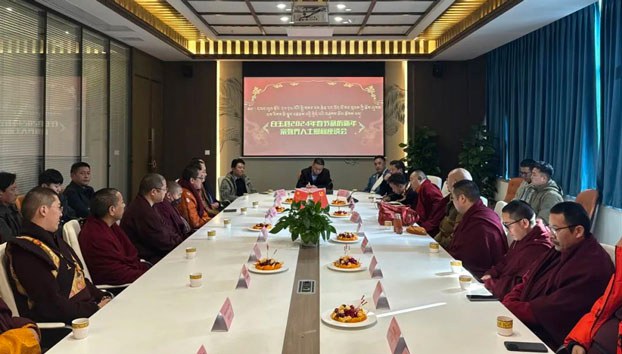(TibetanReview.net, Feb01’24) – Chinese authorities in the historically Tibetan region in Sichuan Province have greeted with bearing of gifts the local people for Losar – the Tibetan New Year coming up on Feb 10 – by asking the leading local religious figures to denounce their exiled spiritual leader, the Dalai Lama. They have also called on the Tibetan monastic community to implement President Xi Jinping’s Sinicization call through an education campaign.
Led by Party Secretary Liu Yan of Palyul (Chinese: Baiyu) County, Chinese officials visited at least 35 Buddhist monasteries in the province’s Kardze (Ganzi) prefecture over Jan 11- 17 for this purpose, reported the Tibetan service of rfa.org Jan 31, citing a statement from the Party’s United Front Work Department.
With offering of Losar greetings, Liu has called on eminent monks in each monastery to “consciously enhance national awareness, legal awareness, and citizen awareness” and “deeply expose and denounce the divisive nature of the Dalai Lama and the Dalai clique” while safeguarding “unity of the motherland.”
The Dalai Lama has for decades called for regional autonomy for Tibet under China’s existing constitution; but China refuses to engage with him, baselessly accusing him of seeking independence for his homeland.
The religious centres visited by the officials were stated to include the Palyul Monastery, Yarchen Gar Monastery and Katog Monastery of the Nyingma school of Tibetan Buddhism.
Besides, in their New Year message to Tibetan Buddhist leaders in Palyul county, Chinese authorities were also stated to have ordered head monks to carry out an “in-depth, systematic study and political education” of the “party’s religious work theories and principles and policies.”

Liu was also reported to have led a separate meeting in Sichuan’s capital Chengdu on Jan 22 with representatives of various religious sects to tell the area’s Tibetan Buddhist leaders to ensure that the monastic groups and their followers “firmly safeguard the unity of the motherland and national unity.”
In particular, he has called on the Tibetan monastic community to promote the “five identifications” policy that President Xi had repeatedly postulated as a requirement for all Chinese citizens and minority groups to adhere to. These include identifying with the motherland, the Chinese nation, the Chinese culture, the Chinese Communist Party and socialism with Chinese characteristics.
Liu has also called for raising awareness about the importance of adhering to President Xi ’s directive for the Sinicization of Tibetan Buddhism, which mandates the adoption of socialist values in the interpretation of religious doctrines, teachings and practices.
The report noted that under the Communist Party’s Administrative Measures for Religious Clergy regulation, adopted by the State Administration of Religious Affairs in Jan 2021, religious clergy members must support President Xi’s plans for the “Sinicization of religion” or “adaptation of religions to China’s socialist society” and work in accordance with the country’s national interest and ideology.


